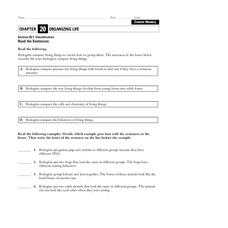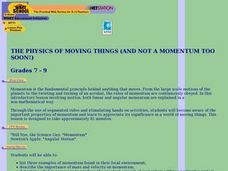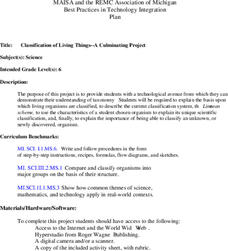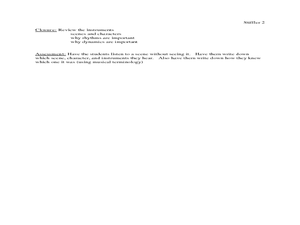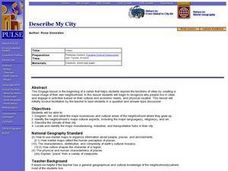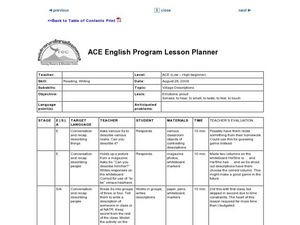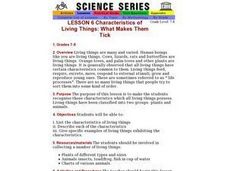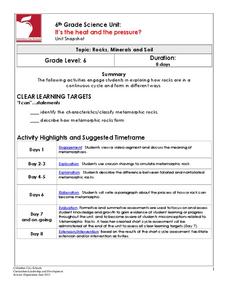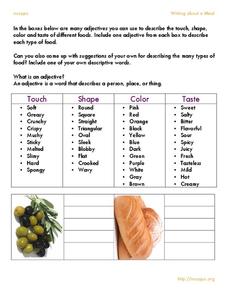Curated OER
Making Comparisons of Living Things
In this comparing living things worksheet, students examine pairs of pictures that show living organisms such as a snail, a cat, a butterfly, a giraffe, and a rabbit. They look at pairs of pictures and orally answer questions using...
Curated OER
Look, Think, and Read- Sentences Describing Pictures- Dogs
Little ones will look, think, then read to determine what the simple sentences are saying. There are three images of dogs doing different things, learners will look at each image then read each of the three simple sentences located next...
Curated OER
Paper Towers
Young scholars have the opportunity to use model-building as a way to help comprehend the forces and phenomena at work in the world around them. They describe gravity as a universal force that pulls everything toward the center of the...
Curated OER
Classification
In this classification worksheet, learners use information describing the ways biologists compare living things to complete 4 matching questions.
Curated OER
Draw an Alien in Natural Habitat
Students apply prior knowledge of living things, structures of living things and how living things sense and respond to their environment. In this habitat instructional activity, students review the basic needs of organisms to survive....
Curated OER
It's Alive! Or is it...?
Students apply their knowledge of the characteristics of living things to unknown creatures to determine whether they can be considered "alive." They watch a Star Trek episode, then describe the characteristics of life.
Curated OER
Living vs. Non-Living Things
Fourth graders describe the characteristics that determine if something is living, dead, or non-living. They determine the difference between living and non-living things. Students determine if an object is living or non-living and...
Curated OER
What is a Living Thing?
In this living things worksheet, students complete a graphic organizer by filling in statements describing the characteristics of living things.
Curated OER
THE PHYSICS OF MOVING THINGS (AND NOT A MOMENTUM TOO SOON!)
Students list three examples of momentum found in their local environment; describe the importance of mass and velocity on momentum; and determine what is necessary to produce the greatest amount of momentum within a particular system.
Curated OER
Classification of Living Things
Sixth graders are provided with a technological avenue from which they can demonstrate their understanding of taxonomy. They will be required to explain the basis u pon which living organisms are classified.
Curated OER
Characteristics of Living Things
Student use the scientific method to experiment with worms. In this characteristics of living things lesson, students predict and examine the reactions of worms to dry and wet soil. Students share their findings.
Curated OER
Analyzing and Describing Music
Students analyze instrumental music. In this instrumental music lesson, students investigate musical works of art. Students describe the instruments they hear and discover the relationship between music and other...
Curated OER
Describe My City
Students explore the functions of cities by creating a visual image of their own neighborhood. Students diagram, list, and label the major businesses and cultural areas of the neighborhood where they grew up, then write a letter to a...
Curated OER
Verbs To Explain What People Or Things Are Doing
In this verbs learning exercise, students analyze a detailed picture of 15 children who are playing in a tree. Students write a sentence with a vivid verb to describe what each child in the picture is doing.
Curated OER
Easter Egg Surprise
Young readers describe objects by using describing words. After reviewing the five senses, they use their senses to gain information about an object. Then as homework, they write three descriptive words about a mystery object and place...
Curated OER
Magnet Magic
Magnets are a source of amazement for young learners. It seems like magic the way they can attract certain things. This activity gives some background on which materials can be attracted to a magnet. Then, learners must circle the words...
Curated OER
Village Descriptions
Students respond to teacher questioning about villages and how their senses help describe things. In this five senses lesson plan, students work in groups to make a written picture of another student in the class. Students...
Curated OER
Characteristics of Living Things: What Makes Them Tick
Learners list the characteristics of living things and give specific examples of living things exhibiting these characteristics. They bring in examples of living things.
Columbus City Schools
It's the Heat and the Pressure?
Ready for a change? Give a comprehensive collection of metamorphic materials a try! With the assortment of printables and lab activities, you won't be under pressure to keep things lively. The unit culminates by having...
Nosapo
Writing about a Meal
You don't need to be a food critic to describe your meal accurately! A series of activities introduce learners to vivid adjectives when writing about the taste, smell, and feel of food. After working with word choice, parts of a...
Columbus City Schools
Let’s Get Theoretical About Cells
Get up close and personal with cells in a hands-on journey to discover what makes up living things. Scholars learn valuable microscope skills, delve into the Modern Cell Theory, and gain insight into how cells reproduce. The included lab...
New South Wales Department of Education
Invertebrates
Of all invertebrates, insects by far are the most numerous. Scholars discuss invertebrates and then use a key to classify them. They see different examples and must describe features of each organism based upon the key.
K12 Reader
My Favorite Food
Everyone has a mouth watering, delectable delicacy that they can talk or write about. Pupils will use this writing prompt worksheet to not only detail their favorite food in writing, but also illustrate what they are...
PBS
The Lorax
Accompany a reading of Dr. Seuss' tale, The Lorax, with a five-item worksheet. Questions challenge scholars to list characters' names, use text details to answer inquiries, and describe the moral of the story.



